Best Motherboard For Home Server (2024 Update)
Selecting the right motherboard is crucial when building a home server. With so many options available, it can be overwhelming trying to determine which one will best suit your needs. When embarking on this purchase, there are a few key factors to consider.
First, examine what you intend to use the server for. Will it primarily serve as network attached storage? Or will you use it as a media server for streaming videos and music? Understanding the server’s main function will help narrow down your motherboard selection.
Next, consider which CPU socket type you require. Common options are LGA 1151 for Intel CPUs or AM4 for AMD. The socket will determine processor compatibility so this is an important decision. You’ll also want to consider the chipset, such as B365 or X470. The chipset impacts features like overclocking capability and connectivity.
You’ll also want to evaluate how much RAM the motherboard supports. More demanding server tasks require higher RAM, so choose a board that can handle the memory you need. In addition, make sure the motherboard has sufficient SATA ports and M.2 slots for your storage drives.
With the right research and planning, you can find the ideal motherboard to power your home server. Ask yourself what you intend to use it for and choose key specifications accordingly. Investing time upfront will ensure your server build gets off to a great start.
10 Best Motherboard For Home Server
| # | Product Image | Product Name | Product Notes | Check Price |
|---|---|---|---|---|
|
1
|
Ideal for high-performance workstation and server applications with support for Intel Xeon processors, ECC memory, multiple storage options.
|
|
||
|
2
|
Ideal for professional and high-performance computing applications with support for ECC memory and multiple PCIe slots.
|
|
||
|
3
|
It is ideal for high-performance computing and data center applications, providing efficient processing power and maximum storage capacity.
|
|
||
|
4
|
Ideal for high-performance gaming PCs with AMD Ryzen processors, featuring PCIe 4.0, dual M.2 slots and advanced power delivery.
|
|
||
|
5
|
Ideal for professional and high-performance computing, multi-tasking, gaming, and multimedia processing.
|
|
||
|
6
|
Ideal for building a server system with an LGA 1151 Intel C246 chipset, offering increased processing power and reliability.
|
|
||
|
7
|
Ideal for building workstations with high computing power and reliability needed for demanding tasks in various industries.
|
|
||
|
8
|
The product is ideal for high-performance gaming systems with support for Intel's latest processors, PCIe 4.0, fast networking and multiple M.2 SSDs.
|
|
||
|
9
|
Ideal for building small server systems with multiple network connections and high storage capacity.
|
|
||
|
10
|
This motherboard is ideal for server workstations that require ECC memory and support for 8th generation Intel processors.
|
|
1. Gigabyte C246-Wu4 (Intel/c246 Express Chipset/atx/ddr4/dual Intel
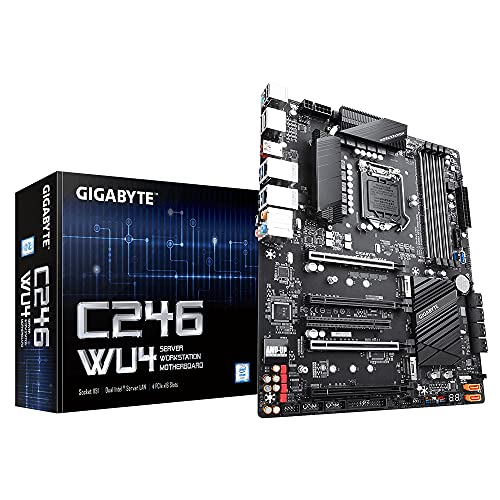
The product in question boasts an impressive compatibility range, supporting Intel 1151 Xeon E processors as well as 9th/8th Gen. Intel Core/ Pentium/ Celeron processors. It also supports DDR4 ECC & non-ECC Un-buffered Memory for optimal performance.
The motherboard has 4 PCIe x16 slots which allow for the use of multiple cards, and also supports AMD Quad-GPU Crossfire and 4-way AMD Crossfire technologies. This feature makes it an ideal choice for gamers and professionals alike.
In terms of networking, the motherboard has dual Intel Server GbE LAN which supports Intel vPro Technology. This ensures a reliable and secure internet connection, which is particularly important for those who require uninterrupted connectivity for their work or gaming needs.
Another notable feature of this product is its large storage capacity. With 10 SATA3 Ports, users have plenty of space to store all of their important files and data.
2. Gigabyte C246m-Wu4 (Intel/c246/micro Atx/ddr4 Support Ecc/2xpciex16/dual Intel
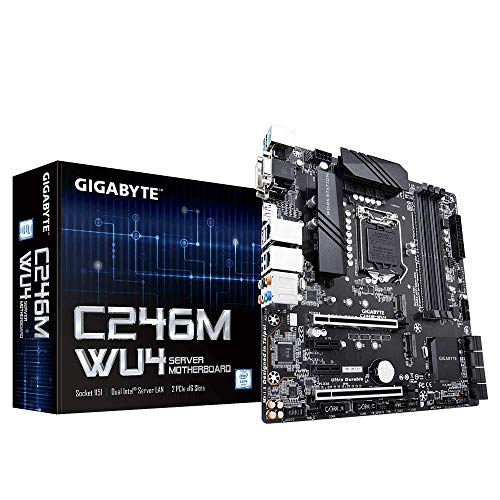
The product being reviewed is a highly capable motherboard that is designed to support a wide range of processors, including Intel 1151 Xeon E processors and 9th/8th Gen. Intel Core/ Pentium/ Celeron processors LGA1151. With its DDR4 ECC and non-ECC Un-buffered Memory support, this motherboard is perfect for users who demand high performance and reliability.
The motherboard features 2 PCIe x16 slots and 2 PCIe x1 slots, making it highly expandable and customizable. This means that users can add additional components and peripherals to their system without worrying about running out of space. The dual Intel Server GbE LAN also supports Intel vPro Technology, which ensures that the system is always up-to-date and secure.
One of the standout features of this motherboard is its large storage capacity, which includes 8 SATA3 ports. This means that users can store a significant amount of data and files on their system without having to worry about running out of space. Additionally, the motherboard is designed to be highly efficient and reliable, which means that users can expect a high level of performance and stability from their system.
3. Asrock Rack
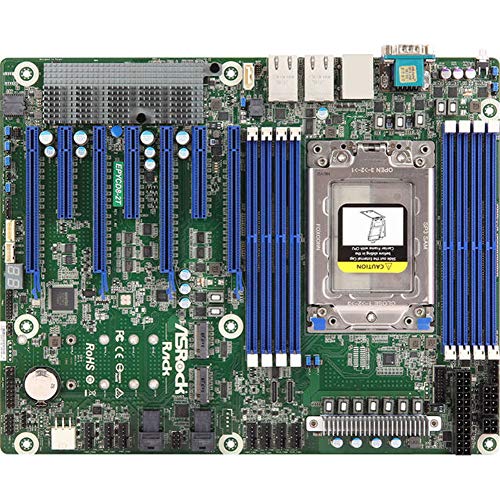
The Single Socket SP3 (LGA4094) is a high-performance motherboard designed for AMD EPYC 7000 series processor family. This motherboard is built to support exceptional computing power and performance for demanding applications.
The Single Socket SP3 (LGA4094) offers 8 x DIMM slots, enabling 8 channels of DDR4 2667/2400/2133 RDIMM and LRDIMM memory. This feature ensures that the motherboard can handle demanding workloads, including virtualization, big data analysis, and high-performance computing.
In addition, the Single Socket SP3 (LGA4094) has 4 x PCIe3.0x16 and 3 x PCIe 3.0×8 slots, providing ample expansion capabilities for high-speed networking, storage, and other add-in cards. This feature is particularly useful for data center and server applications that require high-speed connectivity and storage.
4. Tuf Gaming X570-Plus: Powerful Ryzen Motherboard
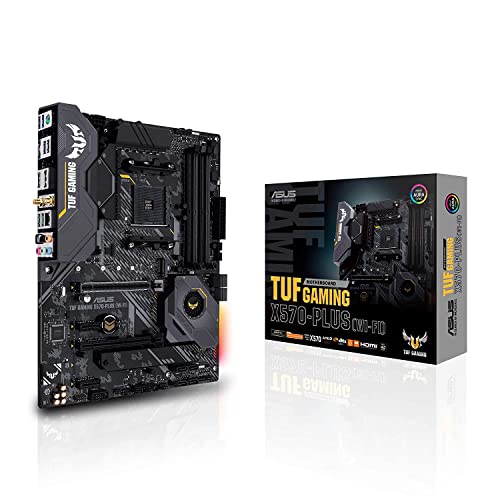
The AMD AM4 socket makes the ASUS TUF Gaming X570-PRO (WiFi 6) motherboard compatible with 2nd and 3rd Gen AMD Ryzen processors. This maximizes connectivity and speed with up to two M.2 drives, USB 3.2 Gen2, and AMD StoreMI.
The motherboard boasts an enhanced power solution with military-grade TUF components, a Pro Cool socket, and Digi plus VRM for maximum durability. Comprehensive cooling is ensured with an active PCH heatsink, VRM heatsink, M.2 heatsink, hybrid fan headers, and Fan Xpert.
Next-gen connectivity is also a highlight with dual PCIe 4.0 M.2 and USB 3.2 Gen 2 Type-A/Type-C. The exclusive Realtek L8200A Gigabit Ethernet and Intel 2×2 802.11ac Wi-Fi with MU-MIMO support, Bluetooth 5.0, TUF LANGuard, and technology make for excellent gaming networking.
It is important to note that users must ensure their BIOS is up to date if installing a compatible Ryzen 5000 series CPU. This can be done by visiting the ASUS website, searching for the motherboard model name, clicking on the “Support” tab, selecting Drivers and Tools, and then downloading the latest BIOS and firmware.
5. Asus Z10pe-D16 Ws Motherboard.
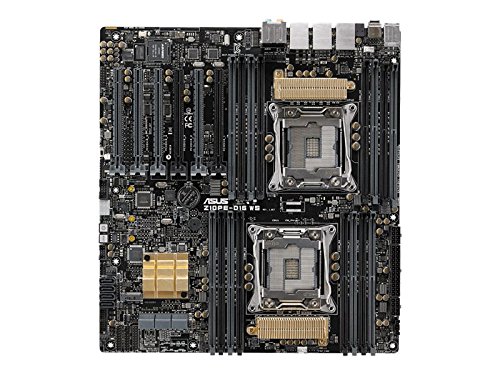
Introducing the Dual Intel Socket 2011-3/ Intel C612 PCH chipset, the perfect solution for those seeking a premium and efficient power source. With a streamlined-airflow design and 16 DIMM slots, this product is built to provide maximum performance while keeping temperatures low. The Supreme Power Solution ensures that industry-leading power efficiency is delivered through premium components.
This product also features a unique BIOS for Dual CPU O.C., allowing users to boost their CPU's overclocking performance by up to 10%. In addition, complete remote server management is made possible with the IPMI 2.0-compliant ASMB8-iKVM module and ASWM Enterprise.
Compatible with a wide range of processors, including Xeon E5-2600 v3 series, Xeon E5-1600 v3 series, Xeon E5-2600 v4 series, and Xeon E5-1600 v4 series, this product ensures versatility and adaptability to fit a variety of needs.
Investing in the Dual Intel Socket 2011-3/ Intel C612 PCH chipset means investing in premium power efficiency, streamlined design, and maximum performance.
6. Asrock Rack Atx Server Motherboard Lga 1151 Intel C246 Model C246 Ws
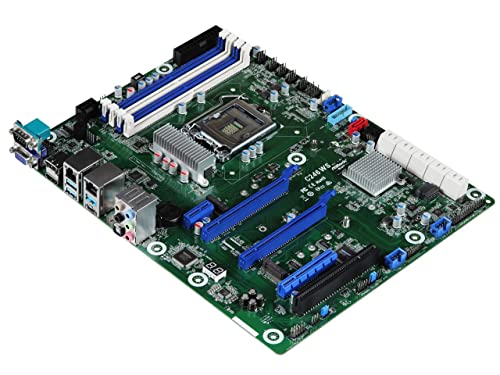
This product is designed to support the latest Intel Xeon E-2100 Series processors, providing high-performance computing capabilities for professionals and enthusiasts alike. With four DDR4 DIMM slots, this motherboard can accommodate dual channel DDR4 2133 / 2666 / 2400 ECC and non-ECC U DIMM, with a maximum capacity of 64 GB.
For storage, this motherboard supports up to eight SATA3 ports, including one SATA DOM, as well as an additional four SATA3 ports provided by the Marvell 9172 controller. In addition to SATA, this motherboard also features three M.2 slots, two PCIe 3.0 x16 slots, one PCIe 3.0 x8 slot, one PCIe 3.0 x1 slot, and one PCI slot, providing ample expansion options for additional hardware.
This motherboard also features two RJ45 GLAN ports provided by the Intel i210 and Intel i219LM controllers, ensuring reliable and high-speed network connectivity. Overall, this motherboard offers a robust set of features and specifications for users looking for a high-performance computing solution.
7. Asrock Rack C236 Ws Atx
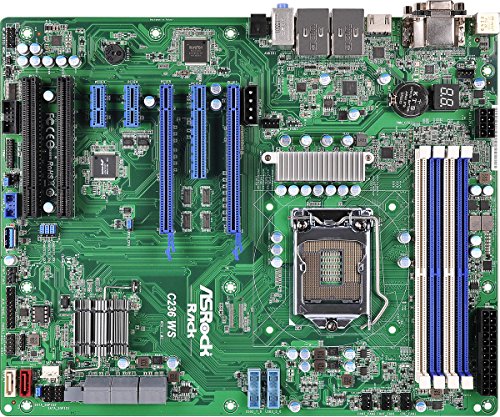
Introducing the ATX 12" x 9.6" motherboard, designed to support the powerful Intel Xeon E3-1200 v5/v6 Series Processors. With 4 DIMM slot support, the motherboard allows for Dual channel DDR4 2133/1866 ECC and U DIMM max 64 GB.
The motherboard also boasts of impressive expansion capabilities with 2 PCIe 3.0 x16, 1 PCIe 3.0 x8, 2 PCIe, and 2 PCI slots. This means that users can connect multiple peripherals and hardware components without worrying about compatibility issues.
In terms of storage, the ATX motherboard supports 8 x SATA3 6Gb/s, including 1 x SATA DOM, and supports RAID 0, 1, 5, 10. This allows for reliable and efficient data storage and management.
8. Rog Z590e Wifi Gaming Motherboard With Thunderbolt
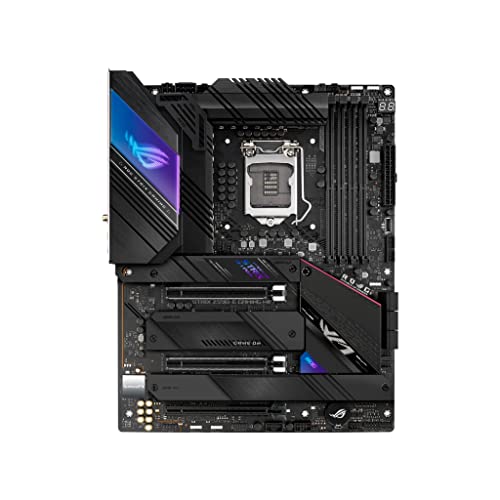
Looking for a powerful motherboard that can support the 11th Gen Intel Core processors? Look no further than the Intel LGA 1200 socket motherboard. Engineered to deliver maximum performance, this motherboard is designed to take your computing experience to the next level.
One of the standout features of this motherboard is its wireless and Bluetooth capabilities. With the 2×2 Tri-Band Intel Wi-Fi a/b/g/n/ac/ax/az + BT5.2, you can enjoy fast and reliable connectivity that is perfect for streaming, gaming, and more.
Another impressive feature of this motherboard is its AI technology. With AI overclocking, AI cooling, AI networking, and AI noise cancelation, you can optimize your system's performance and ensure that it always runs at its best.
In terms of power, this motherboard is equipped with a robust power solution that includes 14plus2 power stages with ProCool II power connector, high-quality alloy chokes, and durable capacitors. This makes it the perfect choice for supporting multi-core processors and other demanding applications.
To keep your system cool and running smoothly, this motherboard features an optimized thermal design that includes a VRM and aluminum I/O heatsink, L-shaped heatpipe, and triple onboard M.2 heatsinks, including an M.2 backplate for improved cooling for PCIe 4.0 M.2 slot.
Finally, for high-performance gaming networking, this motherboard features on-board Intel WiFi 6E AX210 and dual Intel 2.5 Gb Ethernet with ASUS LANGuard. This provides lightning-fast connectivity and ensures that you always stay connected to the online world.
9. Asrock Rack C3558d4i-4l Atom C3558 Mini Itx Motherboard W/quad Gbe Lan, Ipmi, 13 X Sata Connectors
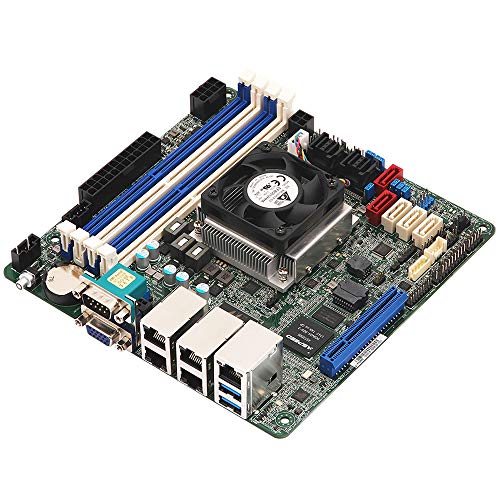
Introducing the Intel Atom C3558 2.2 GHz Quad Core Processor, a high-performance product designed to meet the demands of the modern computing world. With 4 x DDR4 DIMM slots, this processor can support up to 64GB UDIMM or up to 128GB RDIMM, providing excellent performance and speed.
With 13 x total SATA connectors, the processor offers a wide range of connectivity options. It comes equipped with 5 x SATA3 6.0Gb/s Ports, 4 x SATA3 ports via Mini SAS HD Connectors, and 4 x SATA3 ports via Mini SAS HD Connectors (Shared with HSIO x4). This feature allows users to connect multiple devices and peripherals, providing seamless data transfer between them.
The processor also boasts 1 x Realtek RTL8211E Dedicated IPMI, which ensures reliable and secure remote management of the system. Additionally, it comes with 4 x Marvell 88E1543 GbE LAN Ports, which provide high-speed Ethernet connectivity and ensures seamless data transfer.
With its Mini-ITX Form Factor of 170 x 170mm, 6.7" x 6.7" (in inches), this processor is compact and easy to install. It offers excellent performance and speed, making it ideal for a wide range of applications.
10. Asus Ws C246 Pro Workstation Motherboard
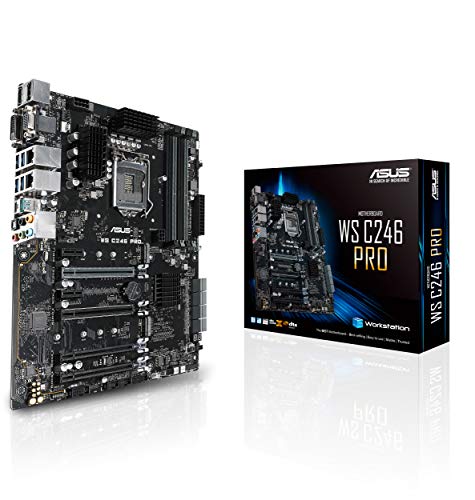
The product is specifically designed to support the 8th generation LGA1151 socket Intel Core and Intel Xeon E-Series processors, providing users with top-notch performance.
One of the standout features of this product is its patent-pending Safe Slot, which boasts an innovative injection molding process. This ensures that the graphics card is properly secured and protected, even when under heavy loads.
In addition, this product also supports up to three independent displays at the same time, which makes multitasking a breeze and enhances productivity. This is especially useful for users who need to work on multiple applications simultaneously.
The product also comes equipped with an 8-Channel HD audio system, which is further enhanced by the ASUS exclusive Realtek ALC887 high definition Audio CODEC. This feature provides users with an immersive audio experience, making it perfect for gamers and music enthusiasts.
Furthermore, this product offers complete IT infrastructure management with in-band ASUS control Center. This allows users to easily manage and monitor their system's performance, ensuring that it remains in top condition.
Best Motherboard For Home Server FAQs
Can I use an older motherboard for my home server, or should I go for a newer model?
It depends on your specific needs and requirements for your home server. If you are looking to build a server with basic functionalities such as file sharing or media streaming, then an older motherboard may suffice. However, if you are planning to run more advanced applications such as virtual machines or database servers, then a newer model may be more suitable.
Newer motherboards typically have better performance, support more advanced technologies, and have more up-to-date firmware and drivers. They may also have more expansion slots for adding additional components such as storage drives or networking cards.
On the other hand, older motherboards may be more affordable and readily available. They may also be compatible with older CPUs and RAM that you may already have on hand.
Ultimately, the decision to use an older or newer motherboard will depend on your specific use case and budget. It is important to do your research and choose a motherboard that meets your needs and is compatible with the other components in your server build.
Is it better to go for a motherboard with integrated graphics or a dedicated GPU for a home server?
When it comes to building a home server, the decision to go for a motherboard with integrated graphics or a dedicated GPU depends on the specific needs and requirements of the server.
If the home server is going to be used for basic tasks such as file sharing, media streaming, and web hosting, then a motherboard with integrated graphics would be sufficient. Integrated graphics are built into the motherboard and can handle basic graphics tasks without the need for a dedicated GPU. This option is also cost-effective as it eliminates the need to purchase a separate GPU.
On the other hand, if the home server is going to be used for more demanding tasks such as gaming, video editing, or running multiple virtual machines, then a dedicated GPU would be a better option. A dedicated GPU can handle more intensive graphics tasks and can provide better performance than integrated graphics.
Ultimately, the decision to go for a motherboard with integrated graphics or a dedicated GPU depends on the specific needs and requirements of the home server. It is important to consider factors such as cost, performance, and the intended use of the server before making a decision.
Is it necessary to have a server-grade motherboard for a home server, or will consumer-grade suffice?
The answer to this question depends on the intended use of the home server. If the server will be used for basic home file sharing and media streaming, a consumer-grade motherboard should suffice. However, if the server is intended for more advanced tasks such as virtualization or hosting multiple websites, a server-grade motherboard may be necessary.
Server-grade motherboards offer features such as dual CPU sockets, support for ECC memory, and more robust power delivery systems, which may be necessary for heavy workloads and constant use. These features also come at a premium price, so it is important to consider the budget when deciding on the type of motherboard to use.
It is also important to consider the compatibility of the motherboard with other components such as the CPU and RAM. It is recommended to do research and choose components that are known to work well together to ensure optimal performance and stability.
Overall, while a server-grade motherboard may offer more features and stability, a consumer-grade motherboard may suffice for basic home server use. It is important to consider the intended use and budget when making a decision.
Should I prioritize expandability or reliability when selecting a motherboard for my home server?
When selecting a motherboard for your home server, it is important to consider both expandability and reliability. However, the priority really depends on your specific needs and usage.
If you plan on using your home server for basic tasks such as file sharing and media streaming, then reliability should be your top priority. You want to make sure that your server runs smoothly and without interruption to ensure your data is secure and accessible at all times.
On the other hand, if you plan on using your server for more advanced tasks such as virtualization or running multiple applications simultaneously, then expandability should be a priority. This means selecting a motherboard that can support a large amount of RAM, multiple CPUs, and has enough expansion slots for additional components.
In conclusion, it is important to assess your specific needs and usage before selecting a motherboard for your home server. Both expandability and reliability are important factors to consider, but your priority should be based on your specific needs.
What are the important factors to consider when choosing a motherboard for a home server?
When choosing a motherboard for a home server, there are several important factors to consider. First and foremost, you need to ensure that the motherboard is compatible with the processor you plan to use. This requires checking the socket type and chipset compatibility.
Another important factor is the number and type of expansion slots available on the motherboard. You should consider the number of PCI-E slots and whether they support the latest standards for high-speed networking and storage.
The amount and type of RAM supported by the motherboard is also important, as is the number and type of storage interfaces, such as SATA and M.2 slots.
In addition, you should consider the quality and reliability of the motherboard manufacturer, as well as the availability of support and firmware updates.
Finally, consider the overall features and capabilities of the motherboard, including its form factor, power delivery system, and integrated networking and audio capabilities.
By carefully considering these factors, you can choose a motherboard that will provide the performance, reliability, and expandability you need for your home server.
What is the best budget-friendly motherboard for a home server?
When it comes to building a home server, choosing the right motherboard is crucial. You'll want a motherboard that is reliable, efficient, and budget-friendly. One option that fits the bill is the ASRock Rack E3C224D2I Mini ITX Server Motherboard.
This motherboard is designed specifically for home servers and offers a range of features that make it an excellent choice for budget-conscious users. It supports Intel Xeon E3-1200 v3/v4 and 4th gen Core i3 processors, which provide plenty of power for basic server tasks. It also has dual Gigabit LAN ports, six SATA3 ports, and two USB 3.0 ports, making it easy to connect and manage your server.
In addition, the ASRock Rack E3C224D2I is incredibly efficient, consuming just 15 watts of power at idle. This means it won't add significantly to your energy bill, making it an eco-friendly choice as well.
Overall, the ASRock Rack E3C224D2I Mini ITX Server Motherboard is a solid choice for anyone looking to build a budget-friendly home server. It offers a great balance of features, performance, and efficiency at an affordable price point.
What kind of networking capabilities should I look for in a motherboard for my home server?
When it comes to selecting a motherboard for your home server, networking capabilities are a critical aspect to consider. The motherboard you choose will have a significant impact on the speed and reliability of your network, so it's important to look for a board with robust networking features.
Firstly, you will want to make sure that your motherboard has a Gigabit Ethernet port. This will ensure that your server can handle high-speed data transfers and reduce network latency.
Secondly, consider investing in a motherboard with multiple Ethernet ports. This will allow you to connect your server to multiple networks or configure a redundant network setup for added reliability.
Thirdly, it's important to look for a motherboard that supports the latest networking standards, such as 802.11ac Wi-Fi and Bluetooth 5.0. This will give you the flexibility to connect your server to a wireless network or other Bluetooth-enabled devices.
Lastly, some motherboards come with built-in networking features, such as network acceleration and traffic management tools. These features can help optimize your network performance and improve the overall efficiency of your server.
In summary, when selecting a motherboard for your home server, prioritize features such as Gigabit Ethernet, multiple Ethernet ports, support for the latest networking standards, and built-in network acceleration and traffic management tools.
What kind of storage options should I look for in a motherboard for my home server?
When it comes to choosing the right storage options for your home server, there are several factors to consider. Firstly, you should look for a motherboard that supports multiple SATA connections. This will allow you to connect several hard drives or solid-state drives (SSDs) to your server, giving you plenty of storage space.
Another important consideration is RAID support. RAID (Redundant Array of Independent Disks) allows you to create a single logical drive from multiple physical drives, providing improved performance, data redundancy, and fault tolerance. Look for a motherboard that supports RAID levels 0, 1, 5, and 10.
If you need even more storage space, you may want to consider a motherboard with support for NVMe SSDs. These high-speed SSDs can provide lightning-fast read and write speeds, making them ideal for use as a boot drive or for storing frequently accessed files.
Ultimately, the storage options you choose will depend on your specific needs and budget. However, by looking for a motherboard with multiple SATA connections, RAID support, and NVMe SSD support, you can ensure that your home server has plenty of storage space and performs reliably over time.
What size motherboard should I choose for my home server?
The size of the motherboard you should choose for your home server depends on several factors, such as the size of your server case, the number of components you want to install, and the level of performance you require. Generally, there are three common sizes of motherboards: ATX, Micro-ATX, and Mini-ITX.
ATX motherboards are the largest and offer the most expansion slots, allowing you to install multiple components such as graphics cards, sound cards, and storage devices. They are suitable for larger server cases and provide high performance, making them ideal for demanding applications.
Micro-ATX motherboards are smaller than ATX but still offer a decent number of expansion slots. They are a good choice for medium-sized server cases and offer a balance between performance and affordability.
Mini-ITX motherboards are the smallest and have limited expansion slots, but they are energy-efficient and suitable for compact server cases. They are suitable for basic server setups and are cost-effective.
In summary, the size of the motherboard you choose will depend on your requirements, budget, and available space. Ensure you choose a motherboard that fits your server case and offers enough expansion options to support your intended use.
Which motherboard brands offer the best options for a home server?
When it comes to building a home server, the motherboard is one of the most important components. Some of the best motherboard brands for home servers include ASUS, Gigabyte, and ASRock.
ASUS offers a wide range of motherboards that are suitable for different purposes. Their TUF series is known for its durability and reliability, making it a great choice for a home server. Additionally, ASUS motherboards come with a user-friendly BIOS interface and offer excellent performance and stability.
Gigabyte is another popular brand that offers high-quality motherboards for home servers. Their server-grade motherboards are designed to handle heavy workloads and provide excellent stability. They also offer a range of features such as dual LAN, support for multiple CPUs, and large storage capacity.
ASRock is a relatively new player in the motherboard market, but they have quickly gained a reputation for offering affordable and reliable motherboards. Their Rack series is specifically designed for server applications and offers excellent performance and stability.
Ultimately, the best motherboard for your home server will depend on your specific needs and budget. However, choosing a motherboard from one of these brands will ensure that you get a high-quality product that is built to last.







